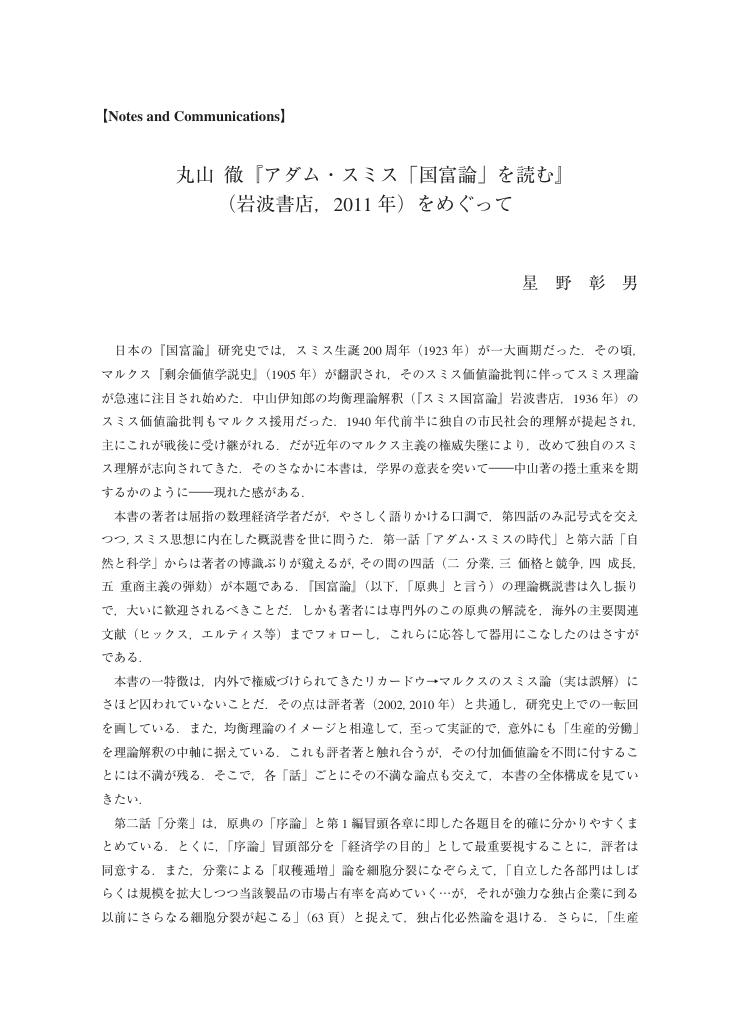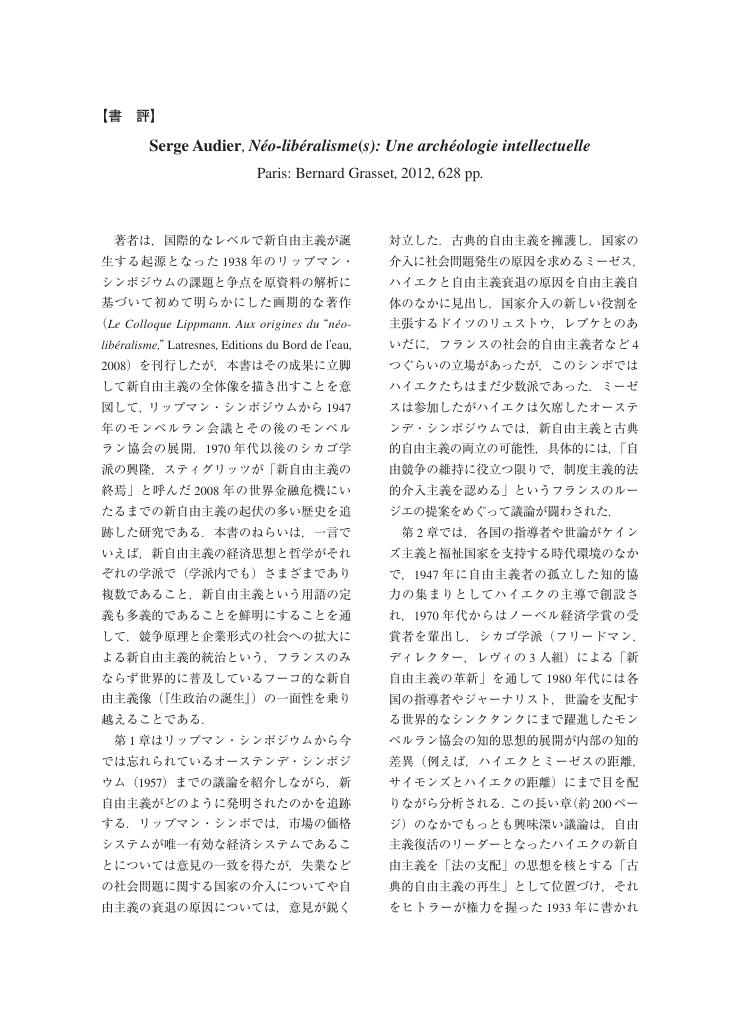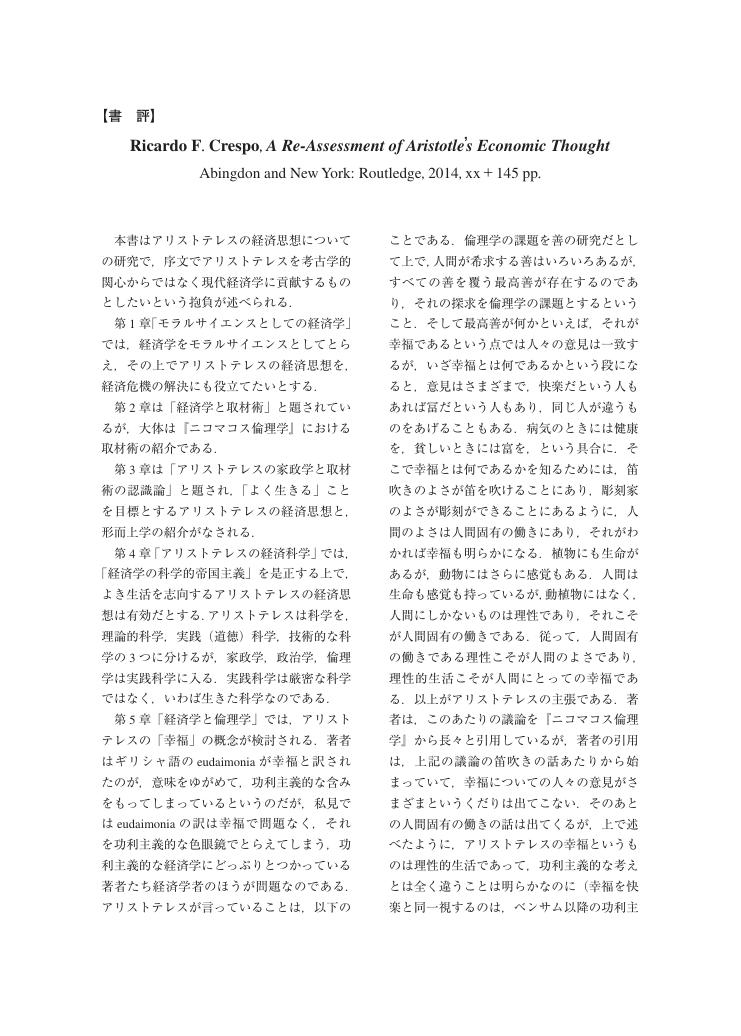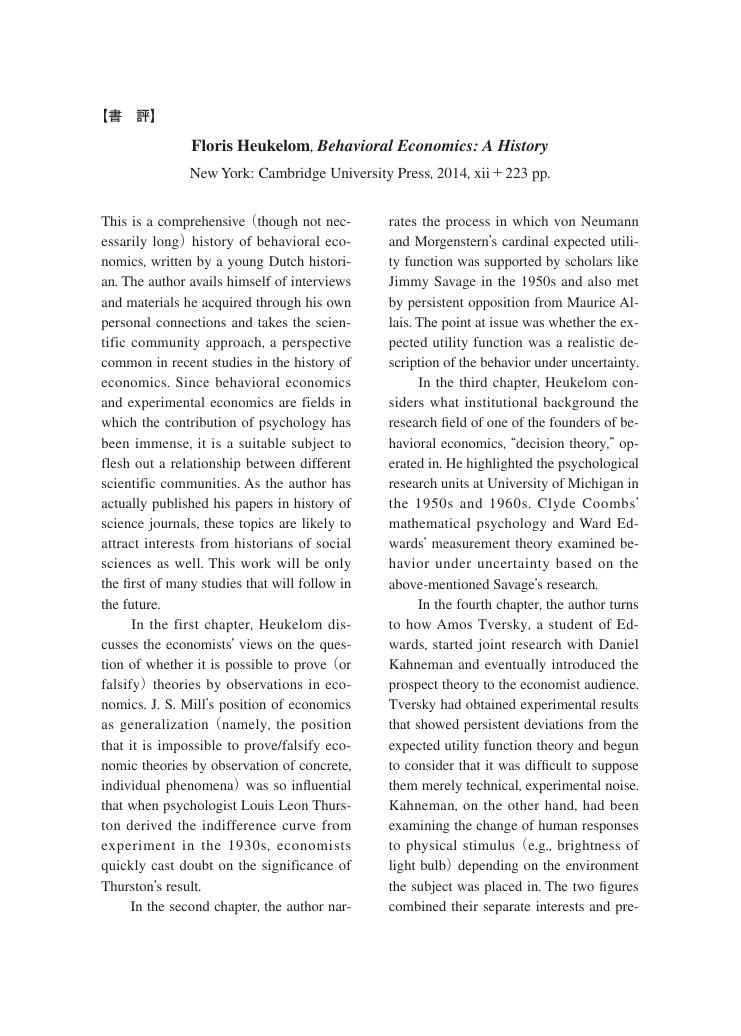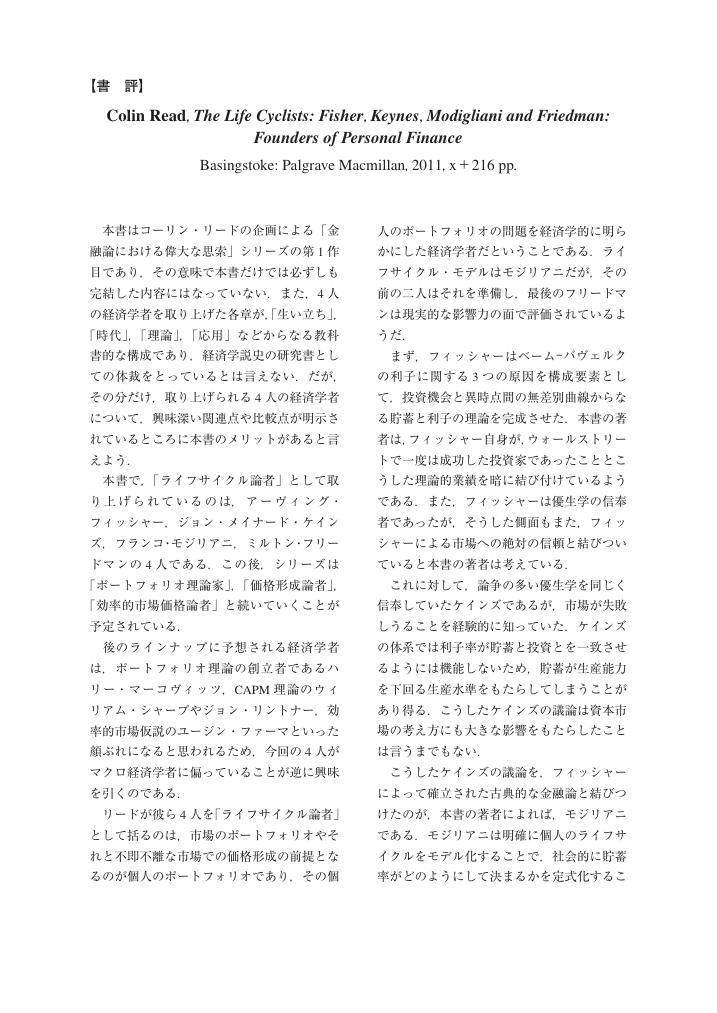1 0 0 0 OA 丸山徹『アダム・スミス「国富論」を読む』(岩波書店,2011年)をめぐって
- 著者
- 星野 彰男
- 出版者
- 経済学史学会
- 雑誌
- 経済学史研究 (ISSN:18803164)
- 巻号頁・発行日
- vol.56, no.2, pp.113-116, 2015 (Released:2019-08-26)
1 0 0 0 OA OBITUARY Mark Blaug (1927-2011)
- 著者
- 原谷 直樹
- 出版者
- The Japanease Society for the History of Economic Thought
- 雑誌
- 経済学史研究 (ISSN:18803164)
- 巻号頁・発行日
- vol.56, no.2, pp.122-124, 2015 (Released:2019-08-26)
- 著者
- 若森 章孝
- 出版者
- 経済学史学会
- 雑誌
- 経済学史研究 (ISSN:18803164)
- 巻号頁・発行日
- vol.56, no.2, pp.125-126, 2015 (Released:2019-11-30)
- 著者
- 森岡 邦泰
- 出版者
- 経済学史学会
- 雑誌
- 経済学史研究 (ISSN:18803164)
- 巻号頁・発行日
- vol.56, no.2, pp.127-128, 2015 (Released:2019-11-30)
- 著者
- 高見 典和
- 出版者
- The Japanease Society for the History of Economic Thought
- 雑誌
- 経済学史研究 (ISSN:18803164)
- 巻号頁・発行日
- vol.56, no.2, pp.129-130, 2015 (Released:2019-11-30)
- 著者
- 高草木 光一
- 出版者
- 経済学史学会
- 雑誌
- 経済学史研究 (ISSN:18803164)
- 巻号頁・発行日
- vol.56, no.2, pp.131-132, 2015 (Released:2019-11-30)
1 0 0 0 OA 西沢保・小峯敦編著『創設期の厚生経済学と福祉国家』 ミネルヴァ書房, 2013
- 著者
- 藤田 菜々子
- 出版者
- 経済学史学会
- 雑誌
- 経済学史研究 (ISSN:18803164)
- 巻号頁・発行日
- vol.56, no.1, pp.149-150, 2014 (Released:2019-08-24)
- 著者
- 水田 洋
- 出版者
- 経済学史学会
- 雑誌
- 経済学史研究 (ISSN:18803164)
- 巻号頁・発行日
- vol.56, no.1, pp.151-153, 2014 (Released:2019-08-24)
- 著者
- 西部 忠
- 出版者
- 経済学史学会
- 雑誌
- 経済学史研究 (ISSN:18803164)
- 巻号頁・発行日
- vol.56, no.1, pp.154-156, 2014 (Released:2019-08-24)
- 著者
- 伊藤 誠一郎
- 出版者
- 経済学史学会
- 雑誌
- 経済学史研究 (ISSN:18803164)
- 巻号頁・発行日
- vol.56, no.1, pp.157-159, 2014 (Released:2019-08-24)
- 著者
- 黒木 龍三
- 出版者
- The Japanease Society for the History of Economic Thought
- 雑誌
- 経済学史研究 (ISSN:18803164)
- 巻号頁・発行日
- vol.56, no.2, pp.1-27, 2015 (Released:2019-08-26)
- 被引用文献数
- 1
Abstract: Izumi Hishiyama, born in Tokyo in 1923, studied and taught at Kyoto University during most of his career after coming back from World War II. His studies can be split into essentially two fields. The first is his examination of the theories of physiocrats represented by Quesnay and of classical economists such as Ricardo, and Sraffaʼs economics that aimed at the revival of the classical economics into the modern economic science. The second is his study of the Cambridge School, led by Marshall and Keynes, which is considered one of the main streams of modern economics. Hishiyama always tried to keep overall views, such as classical and modern, and orthodox and heterodox. He played an active role in leading Sraffian economics in Japan, introducing Sraffaʼs famous paper on the cost of production, “Sulle relazioni fra cos-to e quantità prodotta,” with his own original introduction, as well as the masterpiece, Pro-duction of Commodities by Means of Commodities. Hishiyama is well known abroad for his pioneering work on Quesnayʼs Tableau Fondamental, called “zig-zag,” which was written in 1960. Here, Hishiyama succeeded in distilling the formulae that depict the main message in “zig-zag” (Hishiyama 1960). Another of Hishiyamaʼs well-known works is his study of the relationship between Keynesʼ first painstaking work, A Treatise on Probability, and Keynesʼ later work, The General Theory (Hishiyama 1969). Here, Hishiyama argued that the system described in A Treatise on Probability should be regarded as an essential element of Keynesʼ thoughts, being coupled with the system in The General Theory. Hishiyamaʼs work on economics is, in a sense, unique and original, even from a global perspective. At first glance, his writings appear very academic and professional. However, af-ter reading them, we learn that it is possible to study economics from a much deeper point of view than is typically the case. JEL classification numbers: B11, B12, B22, B31, B51.
1 0 0 0 OA マーシャルにおける組織 生産の経済学の観点からの再評価
- 著者
- 藤井 賢二
- 出版者
- 経済学史学会
- 雑誌
- 経済学史研究 (ISSN:18803164)
- 巻号頁・発行日
- vol.56, no.2, pp.28-46, 2015 (Released:2019-08-26)
Abstract: Marshallsʼ economics has long been regarded as an abbreviated version of general equilibri-um theory by most students and scholars of economics. Despite the fact that those scholars of history of economic thought called as post-Marshallians have endeavored to show the text-book interpretation fails to capture the dynamic aspects of Marshallʼs economics, their ap-peals havenʼt been recognized even in a circle of historians of economic thoughts. Much needs to be done to rectify the present situation. We contend in this paper that the existence and role of firms in Marshallʼs economics is starkly different from those based on transac-tion-cost theory, which has been recognized as an applied and extended version of the stand-ard exchange theory. Whereas firms are interpreted as a cost-saving tool in transaction-cost theory, firms in Marshallʼs economics must be interpreted differently from the angle of plu-tology which means the economics of production. Their main functions are integration and coordination of production knowledge, through which firms become a sort of knowledge community. Firms cannot survive if they remain merely as a collection of production factors. For a firm to function as a knowledge community, Marshall thought that it also had to be a profit-sharing community of principal members of it at least. Marshallʼs view of firms has much in common with modern dynamic capabilities and resource-based approaches. JEL classification numbers: B13, B31.
1 0 0 0 OA Parliamentary Economists and Social Reform:
- 著者
- Syrmaloglou Adamantios
- 出版者
- The Japanease Society for the History of Economic Thought
- 雑誌
- 経済学史研究 (ISSN:18803164)
- 巻号頁・発行日
- vol.56, no.2, pp.47-66, 2015 (Released:2019-08-26)
Abstract: The “Japanese” were a group of seven politicians in the Hellenic Parliament between 1906 and 1908 who stood for the modernization of the state and for social reform, after the imposi-tion of International Financial Control over Greek finances in 1897. Their name was due to Japanʼs emergence after the Russo-Japanese War as a modernizing force in global politics. The present paper traces the trajectory of the “Japanese” in Greek politics from their forma-tive years to their final split as a distinctive political group, and discusses their economic views, putting them in the context of economic developments in the country. Emphasis is placed on two politicians, Dimitrios Gounaris and Petros Protopapadakis, because they were prominent in economic policy debates and had clear-cut views on economic policy reform. We investigate their importance for the evolution of economic thought in Greece, the strengths of their arguments, and the reasons for the groupʼs ultimate failure to exert a lasting influence in Greek politics. JEL classification numbers: A 11, B30.
- 著者
- 山崎 好裕
- 出版者
- 経済学史学会
- 雑誌
- 経済学史研究 (ISSN:18803164)
- 巻号頁・発行日
- vol.56, no.1, pp.129-130, 2014 (Released:2019-08-24)
- 著者
- 中川 栄治
- 出版者
- 経済学史学会
- 雑誌
- 経済学史研究 (ISSN:18803164)
- 巻号頁・発行日
- vol.56, no.1, pp.132-134, 2014 (Released:2019-08-24)
- 著者
- 石田 教子
- 出版者
- 経済学史学会
- 雑誌
- 経済学史研究 (ISSN:18803164)
- 巻号頁・発行日
- vol.56, no.1, pp.135-137, 2014 (Released:2019-08-24)
1 0 0 0 OA Liana Vardi, The Physiocrats and the World of the Enlightenment Cambridge University Press, 2012
- 著者
- 米田 昇平
- 出版者
- 経済学史学会
- 雑誌
- 経済学史研究 (ISSN:18803164)
- 巻号頁・発行日
- vol.56, no.1, pp.138-140, 2014 (Released:2019-08-24)
1 0 0 0 OA 井上義朗『二つの「競争」――競争観をめぐる現代経済思想』 講談社現代新書, 2012
- 著者
- 伊藤 宣広
- 出版者
- 経済学史学会
- 雑誌
- 経済学史研究 (ISSN:18803164)
- 巻号頁・発行日
- vol.56, no.1, pp.141, 2014 (Released:2019-08-24)
1 0 0 0 OA 佐々木憲介『イギリス歴史学派と経済学方法論争』 北海道大学出版会, 2013
- 著者
- 上宮 正一郎
- 出版者
- 経済学史学会
- 雑誌
- 経済学史研究 (ISSN:18803164)
- 巻号頁・発行日
- vol.56, no.1, pp.144-146, 2014 (Released:2019-08-24)
1 0 0 0 OA 田中正司『アダム・スミスの認識論管見』 社会評論社, 2013
- 著者
- 星野 彰男
- 出版者
- 経済学史学会
- 雑誌
- 経済学史研究 (ISSN:18803164)
- 巻号頁・発行日
- vol.56, no.1, pp.147-148, 2014 (Released:2019-08-24)
